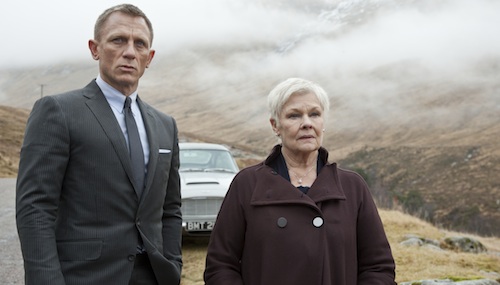REVIEW: A Second Opinion on 'Skyfall'
Skyfall had the potential to be the best James Bond film ever. It isn’t.
Casino Royale successfully paved the way for a complete retcon of the iconic superspy, opening its doors to much darker characters and plot elements that previous, much more romanticized Bond films couldn’t explore. The series stumbled with Quantum of Solace but concluded the Vesper Lynd storyline, meaning Skyfall could start over with a completely new plot that owed nothing to the two previous films.
If Casino Royale was the reboot and Quantum of Solace was meant to be the all-hell-breaks-loose visual pornography of car and plane chases, Skyfall would give the series a chance to truly give meaning to James Bond, a character we still know little about even through 23 films.
(This structure was popularized by Christopher Nolan’s Batman trilogy, and the same kind of character arc should be expected for the upcoming Iron Man 3, though Craig is still signed on for two more Bond films.)
The buzz on the film was positive from the start. Javier Bardem was cast as the villain, the first time an Academy Award-winning actor had done so since Christopher Walken in A View to a Kill. But what got me excited was Sam Mendes being tabbed as the director, whose previous works show he has the ability to flesh out raw and multi-layered characters like Lester Burnham in American Beauty and Frank Wheeler in Revolutionary Road. He was the perfect choice to give more meaning and more layers to Craig’s Bond, which was far more complex than previous iterations.
Skyfall was a good film, superior to Quantum of Solace but fell well short of Casino Royale, and for that reason I felt kind of disappointed. Skyfall was supposed to be the continuation of a blonde-haired, blue-eyed, much tougher and darker version of Bond, but instead what we got was a film that paid a two-and-half hour homage to the previous 22 Bond films and felt like a gaping hole of missed opportunity. It certainly doesn’t help when a title card paying tribute to 50 years of Bond shows up at the end of the movie. Like Superman Returns, Skyfall felt like a calling card to its previous films rather than establishing completely new canon.
This was the most frustrating about Skyfall. There didn’t seem to be anything original. When 007 was presumed dead to start the film, it made for a fascinating premise. What was Bond going to be like when he returned? Would he be more loyal or less loyal to MI6? Does this make him a more calculating and cold hitman or would the bullet be a metaphor for punishment and repentance? Though the idea of Bond presumed dead is nothing new, it certainly wipes the slate clean to give Bond new meaning and purpose. Exploring a character while they’re going through some sort of crisis was supposed to be Mendes’ forte.
The major premise of Skyfall is the death and rebirth of James Bond. Yet, the film felt more like a revival than a rebirth. Rather than providing more layers of meaning and depth to Bond, Skyfall had reverted back to what were signatures in Bond films.
Bardem’s Raoul Silva had a physical defect, like Ernst Stavro Blofeld. There’s a brief confrontation with predators, but instead of sharks we get komodo dragons. Q returns, providing Bond with high-end gadgetry, this time a (barely used) palmprint-activated gun. The Aston Martin DB5, made famous in Goldfinger, is also back. The film even makes a blunt reference to an exploding pen, which was featured in GoldenEye. (Here’s a guide to the homages from Skyfall).
Skyfall makes a great deal about Bond’s return from injury, a metaphorical resurrection. It’s implied that even with a bullet wound in his shoulder and aging body, Bond is still a venerable agent by sheer force of will (which was ultimately an abandoned storyline). But that’s never tested in Skyfall because unlike in Casino Royale, at no point in Skyfall did it ever feel like Bond was in immediate danger. That he was raw and vulnerable was what made Craig’s Bond so captivating in the first place. In Skyfall, MI6 is attacked, but Bond wasn’t the target. Even when Bond was captured by Silva, it didn’t have the same gravitas or sense of helplessness as in Casino Royale when Bond was tortured and Vesper’s fate was unknown, both to Bond and the audience.
Skyfall is also see the first time Craig’s Bond has killed a major villain, which hasn’t happened since The World Is Not Enough. Though the implied homosexuality of the character certainly changed the dynamic with Bond, I don’t think Silva was particularly memorable. His motives and ultimate master plan, like planning to be caught before wrecking havoc from within, are reminiscent of other films. His anti-climactic death certainly didn’t bring any new revelations about Bond, which is unfortunately the case with most of his other villains. Silva’s death, like Alec Trevelyan’s in GoldenEye (another former MI6 agent), should’ve meant something, and if any actor could’ve brought out the most between Silva and Bond, Bardem was certainly one of them.
I will give Skyfall one thing – we learned more about the fictional history of James Bond than in any other film. But still, none of the things we learn, among them the names of the parents of Bond and his country of origin (already established in Ian Fleming’s books), add anything to the character’s depth, and feel trivial compared to what had been established in Casino Royale. The diner car scene in which Vesper and Bond take turns picking each other apart simply by looking at each other’s clothes gave us more insight to Bond than in any other Bond film in recent memory.
Ralph Fiennes was great and Ben Whishaw stole the show. Mendes’ director trademarks, the long, wide shots of symmetrical patterns, were a welcome sight. Daniel Craig and Judi Dench were impeccable, and at this point slipping back into those characters should be second nature. Where Skyfall fell short was in originality, both in plot and character development. Perhaps it was the pressure of having to acknowledge the past fifty years of Bond films, but the homage felt overdone, and as a result Skyfall lacked the room to really breathe new life into Craig’s Bond, which had started off with so much potential in Casino Royale.
If you'd like to read more of Jason's writings, you can check out his blog, Armchair Hockey, where he covers the many permutations of the sports world. You can also find him on Twitter here.
What did you think of Skyfall? Were you pleased by Mendes’ more thoughtful take on the secret agent? Or are 23 films too much for you? Join the conversation in the comments section! If you liked this review, share it with your friends and followers, and browse through some of my recent reviews here:
-
Recent Releases:
Cloud Atlas | Seven Psychopaths | Argo | Looper
Reviews of Classic Movies:
Doctor Zhivago | Dirty Harry | Rope | The Graduate
-





